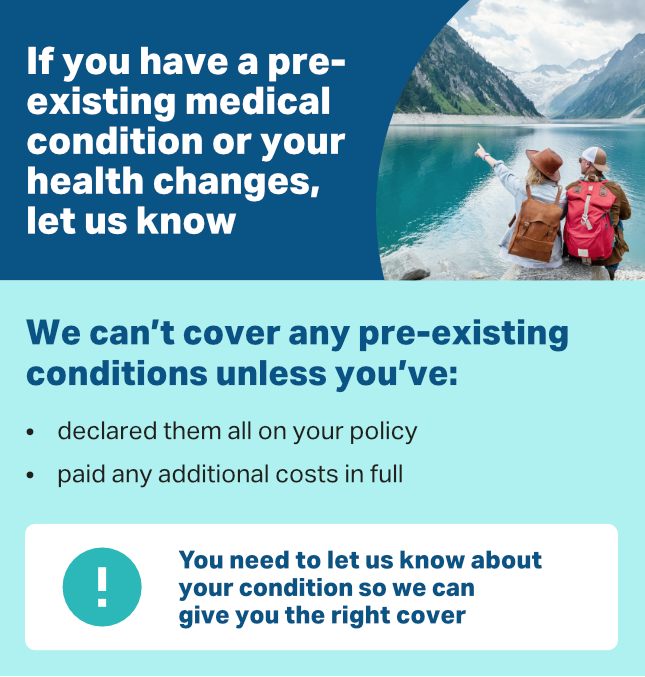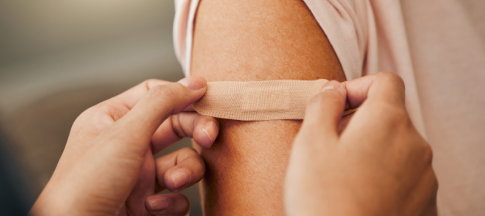
If you're travelling round Europe, it's important you can access medical care if you need it. That's where a Global Health Insurance Card (GHIC) or your old European Health Insurance Card (EHIC) helps.
We chat through what an EHIC/GHIC is, why you need it and how to get it.
What’s the GHIC?
A GHIC is a card that lets you access medical treatment for a lower cost or even for free if you're on a trip to Europe.
You can use it at lots of different European medical facilities that are in a reciprocal health agreement with the UK. The card shows you're a UK resident and are eligible for medical care.
It officially replaced the EHIC when we left the EU, although you can still use your old EHIC if it hasn’t expired yet.
What’s the EHIC?
The EHIC was first introduced in 2004, replacing the old E111 system for tourists.
It’s a free card for residents in the European Economic Area (EEA) (except Iceland, Liechtenstein, Norway and Switzerland, where the EHIC hasn’t been valid since 2020).
Like we said, it's now been replaced by the new GHIC! But you can still use yours if it's not expired yet.
Where is the GHIC/EHIC valid?
The GHIC and EHIC are valid in medical facilities located in the following countries: Austria, Belgium, Bulgaria, Croatia, Cyprus, Czech Republic, Denmark, Estonia, Finland, France, Germany, Greece, Hungary, Ireland, Italy, Latvia, Lithuania, Luxembourg, Malta, Netherlands, Poland, Portugal, Romania, Slovakia, Slovenia, Spain, Sweden, and the UK.
Why do I need an EHIC/GHIC?
Owning an EHIC or the new GHIC means you can get medical treatment at an approved facility when you're abroad in one of these European countries.
The card tells foreign medical professionals about your identity and medical history. It also reduces the cost of medical expenses or makes them free of charge, depending on the country and facility.
How do I get a GHIC?
You can apply for a GHIC through the NHS website. The GHIC is free, so you should avoid any websites that ask for payment.
It’ll take 10 days for your card to arrive in the post.
How do I know if my EHIC/GHIC is expired?
Your EHIC card will have an expiry date on the bottom right-hand side. When your EHIC expires, you'll need to apply for a GHIC.
Your GHIC card will also have an expiry date clearly marked. It's valid for five years. After that, you'll need to renew it.
Can I use the GHIC for private medical treatment at home or abroad?
No.
You can’t use the GHIC or old EHIC for private medical treatment in the UK or abroad. You're also not allowed to use them for any planned medical treatment abroad, like giving birth.
Also, you're not allowed to use the card if you're relocating to work or study in the EEA or Switzerland.
Using the GHIC abroad
If you need medical assistance abroad, it’s a good idea to find a hospital or pharmacy that accepts the GHIC card.
If you use your GHIC to get treatment, you won’t need to pay any excess on your medical expenses claim.
Another point to remember is that if you’re with Admiral and the cost for your medical treatment is less than £500, you can pay those costs upfront and then claim it back when you get home from holiday (subject to policy terms).
For less serious medical issues, this is often easier than calling the medical emergency helpline while you’re on holiday, as this can take a few days to organise.
You just need to make sure you keep all your receipts so that you can make a claim via our online claim form when you get home.
Some different insurers offer this option too, so it’s always worth checking your policy book to see what you’re covered for.
Do I still need travel insurance?
Yes. Having the GHIC or old EHIC isn't a replacement for travel insurance.
You should still buy a policy to make sure you're covered in the event of emergency and non-emergency medical treatment, and for other incidents like your belongings being stolen or cancellations.
The GHIC or EHIC works as a faster ticket to effective and safe treatment and reduces its cost.
If you need medical treatment when travelling on the continent, whether for a new or pre-existing medical condition, we suggest that you find a facility that accepts the GHIC or EHIC.
If you don't get treatment from one of these facilities, you'll have to pay excess on medical costs abroad.
If you're a UK resident and are planning a trip, make sure you have a valid GHIC or EHIC as well as a comprehensive travel insurance policy and European cover.

MoneyHelper directory
If we can’t cover your medical condition, you can use the MoneyHelper directory to find a specialist insurer who might be able to cover you if you’ve been:
- refused travel insurance or had your policy cancelled
- offered cover with a medical exclusion that you can’t remove from your policy
- quoted a price for a travel insurance policy with high medical costs
MoneyHelper makes it easier to find and compare policies you can afford that cover your condition and medical needs. Access the MoneyHelper directory online or call MoneyHelper on 0800 138 7777 (phone lines are open Monday to Friday, 8:00am to 6:00pm, excluding bank holidays).


